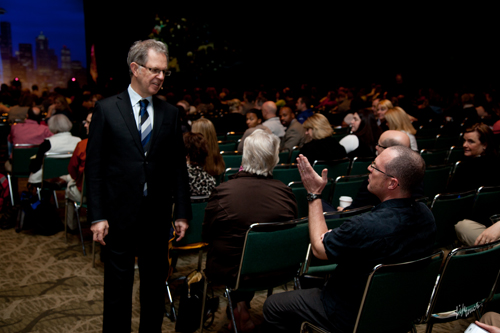

"You have to invest in the whole system." -- Randi Weingarten.
Photo courtesy of the American Federation of Teachers.
Here's a powerful challenge to the world of education: Improve the profession of teaching. If you believe that the future of learning depends on the future of teaching, Andy Hargreaves' and Michael Fullan's latest collaboration, Professional Capital, proposes an action plan for teachers, administrators, schools and districts, and state and federal leaders as to how to create a 21st century generation of professional teachers.
Over the next few days in The Global Search for Education series, I discuss with Michael Fullan, Andy Hargreaves and Randi Weingarten, President of the American Federation of Teachers, some of the issues as well as some of the strategies necessary to make this a reality. First up, I asked Randi to summarize what she believes the Professional Capital model would mean in terms of changes in policy and practice?
Randi explained:
In Professional Capital, Hargreaves and Fullan are saying you have to invest in the whole system as opposed to believing that individual strategies will get you where you need to go. They are totally right. This push on individual effort, meaning if individuals just work really hard they will see huge returns, is wrong. In the long term it will backfire if you are trying to help all kids instead of some kids. They make that point brilliantly. And now of course you have examples of this all around the world. Look at Finland and Singapore and Japan and Canada. These countries are taking a page out of Hargreaves' and Fullan's book.

"The new generation of teachers must be an entire community of professionals who are deeply committed to their work and highly capable of carrying it out." -- Andy Hargreaves.
Photo courtesy of National Elementary School Principal Association and Andy Hargreaves.
To find out more about the thinking and action plan laid out in their book, I asked Hargreaves and Fullan for their answers to these questions:
How do you envision the next generation of teaching in your book, Professional Capital?
The new generation of teachers must be an entire community of professionals who are deeply committed to their work and highly capable of carrying it out. This requires teachers to be highly motivated, thoroughly prepared, continuously developed, properly paid, well networked with each other to maximize their own improvement, and able to make effective judgments using all their capabilities and experience. This generation will require three kinds of capital that make up what we call professional capital. First is the individual human capital of rigorous training and qualifications, as well as high emotional intelligence and proven success in working with young people. Second is the social capital of schools as communities where teachers collaborate together, are committed to their students and each other as people, are able to have challenging conversations about their own and their students' performance, and have the benefit of working in the high-trust environments that are associated with superior performance and results. Last is the decisional capital that comes from accumulating and reflecting on sufficient years of practice -- at least 8 in most cases -- to reach peak levels of performance in making the effective judgments that are central to all professional practice.
Many believe that education policy at the moment focuses on the extremes of teaching, i.e. those teachers that are good and those that are bad. How has teaching to the test handicapped the art of teaching?
One of the most misunderstood and misapplied research findings is that if two students start equally and one experiences very good teachers for three years in a row, and the other has poor teachers for the same time period, the former student will move 50 percentile points above the less fortunate student. So far, this is only a statistical proof, but even if it were literally true, the leap in logic to reward the top teachers and punish the weak ones would still be misguided. Teaching to the test and allocating merit based on test results compounds the problem. The truth is that in high performing countries, policies and development focus on the entire profession getting better all the time. This means that most students will predictably encounter three good teachers in a row---not by fortune but by design. This is why those countries with the best teaching profession continually get the best results. Furthermore, when almost every teacher is good and is constantly learning rather then getting drive-by training in top-down priorities, they rub off on each other. They create a positive culture in which they push and also pull each other into energizing improvements where all teachers and therefore all students are bound to learn.

"All levels of leadership, from the very top must, like Finland, portray teaching as one of the most socially valuable and intellectually challenging jobs in society." -- Andy Hargreaves.
Photo courtesy of National Elementary School Principal Association and Andy Hargreaves.
In Finland, teaching is not just a job, it is a profession. How does your model propose to turn teachers into pros in terms of their skills, knowledge, capacities, and emotional intelligence?
First, all levels of leadership, from the very top must, like Finland, portray teaching as one of the most socially valuable and intellectually challenging jobs in society. This is why applicants to elementary teaching in Finland have a less than 10% chance of being accepted. Teachers are valued and respected in the society, not just because they make sacrifices, but also because they are smart. Teacher education should be rigorous, university based, and also profoundly rooted in school practice, and there should be fewer institutions providing it -- creating more quality and coherence as a result. More resources should be moved to support the quality of teaching and learning in all schools and classrooms and less should be squandered on things like transportation because of proliferating school choice, on the legal and other costs associated with escalating levels of special needs identification because an excessively standardized curriculum cannot accommodate differences, and on the exorbitant cost of educational testing services in a country that tests more students on more things more of the time than any other developed nation. Teachers need more freedom, not less, to respond to and collaborate around their students' diverse needs and circumstances as is true in the highest performing nations such as Finland, Singapore and Canada. Accountability occurs because teachers work transparently with each other and are committed to ongoing improvement and openness about progress and results. When schools fall short, there should be incentives and resources so higher performing schools can assist them -- peers helping peers and schools helping schools -- rather than parachuting in temporary turnaround teams from the top.
Andy Hargreaves is the Thomas More Brennan Chair in the Lynch School of Education at Boston College (www.andyhargreaves.com).
Michael Fullan is Professor Emeritus of the Ontario Institute for Studies in Education of the University of Toronto (www.michaelfullan.ca).
More information about Professional Capital

Randi Weingarten, Michael Fullan, Andy Hargreaves, C. M. Rubin
Later this week in the Global Search for Education: In Search of Professionals, Part 2 -- an interview with Randi Weingarten, President of the American Federation of Teachers.
In The Global Search for Education, join me and globally renowned thought leaders including Sir Michael Barber (UK), Dr. Michael Block (US), Dr. Leon Botstein (US), Dr. Linda Darling-Hammond (US), Dr. Madhav Chavan (India), Professor Michael Fullan (Canada), Professor Howard Gardner (US), Professor Yvonne Hellman (The Netherlands), Professor Kristin Helstad (Norway), Jean Hendrickson (US), Professor Rose Hipkins (New Zealand), Professor Cornelia Hoogland (Canada), Mme. Chantal Kaufmann (Belgium), Dr. Eija Kauppinen (Finland), State Secretary Tapio Kosunen (Finland), Professor Dominique Lafontaine (Belgium), Professor Hugh Lauder (UK), Professor Ben Levin (Canada), Professor Barry McGaw (Australia), Shiv Nadar (India), Professor R. Natarajan (India), Dr. Denise Pope (US), Sridhar Rajagopalan (India), Dr. Diane Ravitch (US), Sir Ken Robinson (UK), Professor Pasi Sahlberg (Finland), Andreas Schleicher (PISA, OECD), Dr. Anthony Seldon (UK), Dr. David Shaffer (US), Dr. Kirsten Sivesind (Norway), Chancellor Stephen Spahn (US), Yves Theze (Lycee Francais US), Professor Charles Ungerleider (Canada), Professor Tony Wagner (US), Sir David Watson (UK), Professor Dylan Wiliam (UK), Dr. Mark Wormald (UK), Professor Theo Wubbels (The Netherlands), Professor Michael Young (UK), and Professor Minxuan Zhang (China) as they explore the big picture education questions that all nations face today.
The Global Search for Education Community Page
C. M. Rubin is the author of two widely read online series for which she received a 2011 Upton Sinclair award, "The Global Search for Education" and "How Will We Read?" She is also the author of three bestselling books, including The Real Alice in Wonderland.
